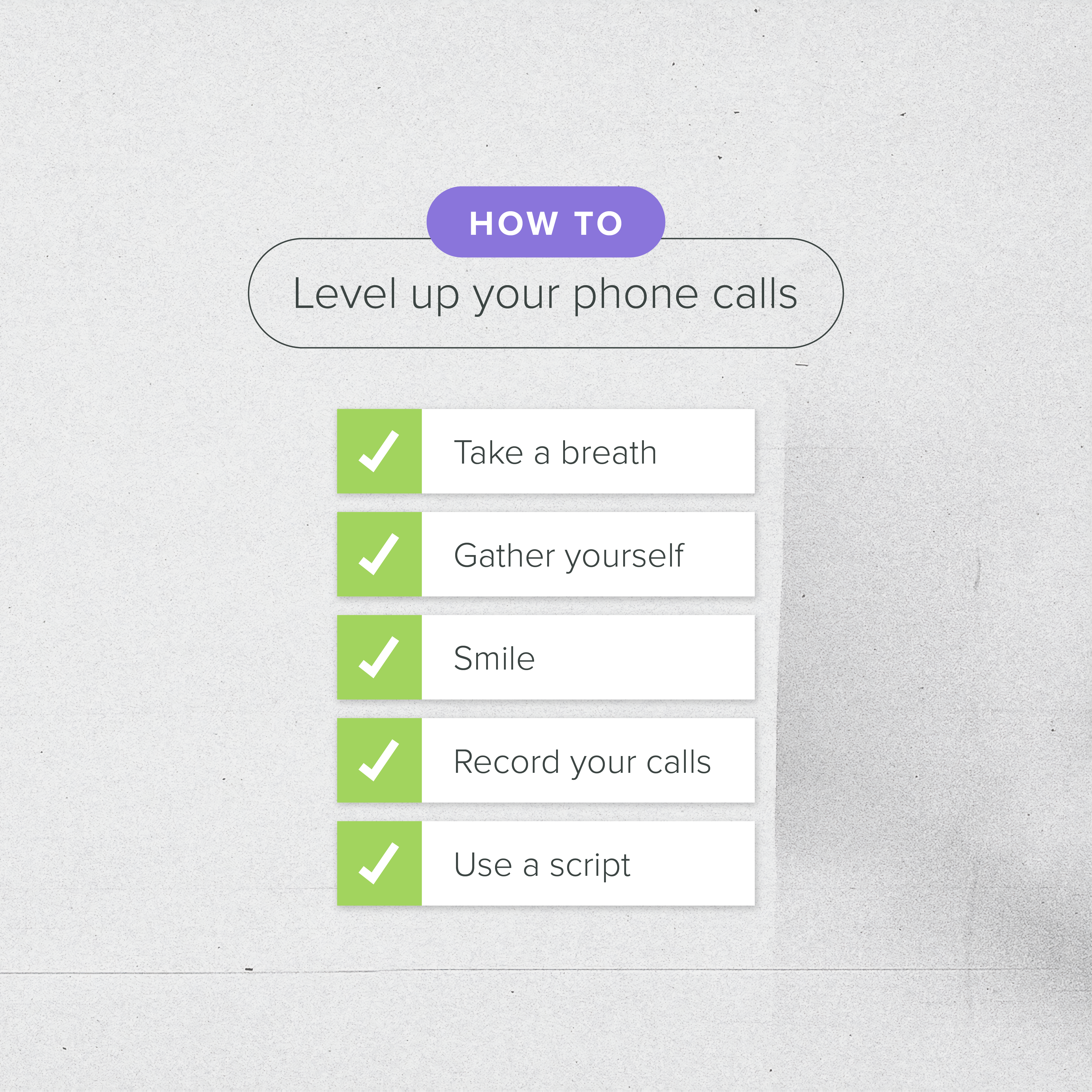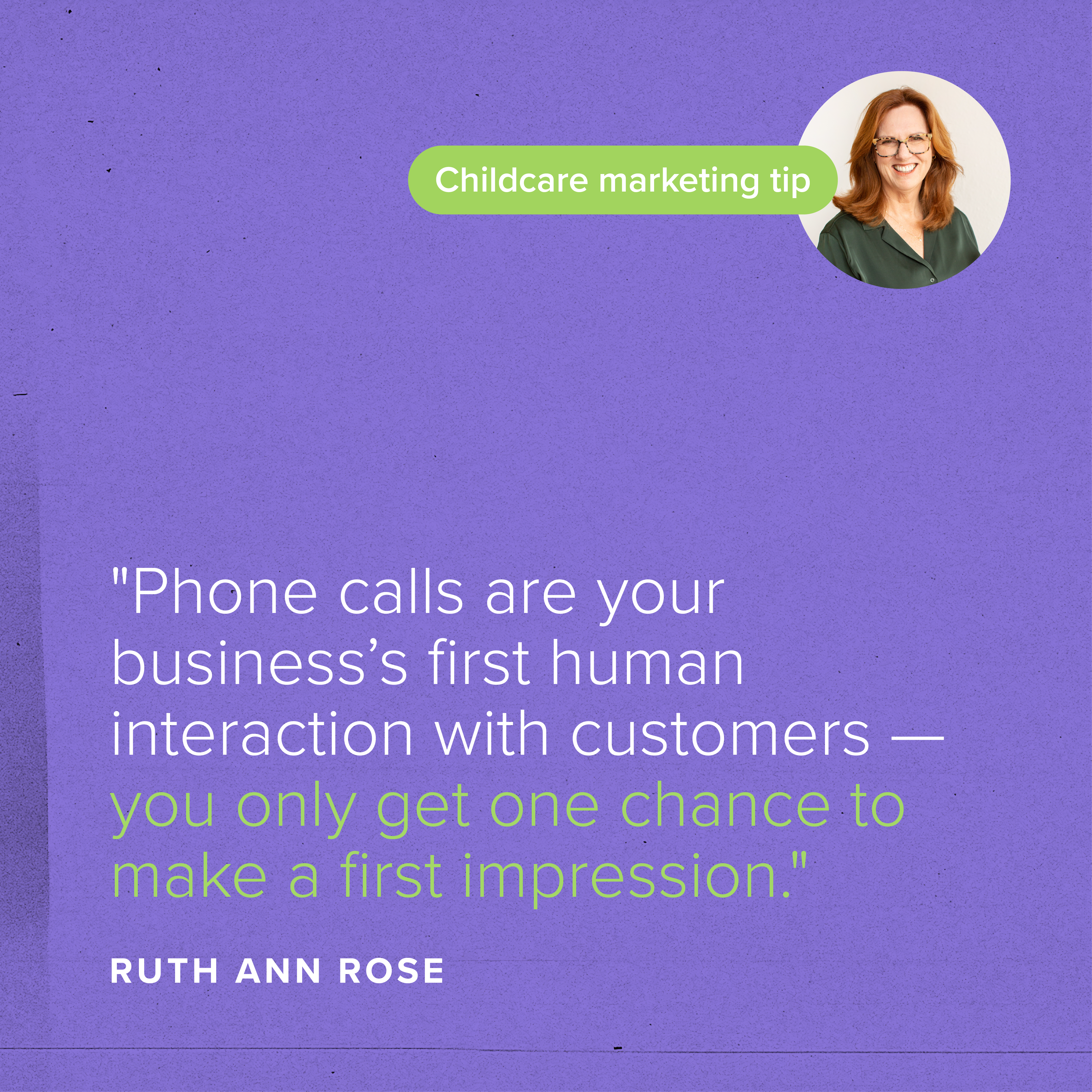How does your staff answer phone calls? The answer to this question is a hinge point for your entire business.
Mishandled phone calls undermine all your marketing efforts. Calls are your business’s first human interaction with customers, and you only get one chance to make a first impression.
We’ve previously discussed the importance of answering phones, but today, we’re diving deeper. We’ll review advanced tactics and provide a sample script to help you and your staff improve your phone skills.
Advanced Tactics for Answering Phone Calls
Here are three ways to level up your phone answering process and convert more leads.
1. Take a Breath and Gather Yourself
It may sound elementary, but it’s essential. Before answering the phone, make sure you’re ready to answer the phone.
Childcare centers can be places of (controlled) chaos, noise, and stress. These are not things you want to convey to a potential client over the phone.
So, before you answer that call, take a breath. Close your eyes, smile, and remind yourself that you can do this.
Give the caller a sense of confidence and serenity through your tone of voice. They’re looking for peace of mind, and it’s your job to prove they’ll find it at your school.
2. Record Your Calls
Recording phone calls is a game-changer. It allows you and your staff to learn from your mistakes and identify who is the best at answering the phone.
These insights are essential in training new staff. Use 10 great calls to train new hires and have them shadow your best performers to learn how to answer phones and convert callers (i.e., schedule tours and enroll kids).
Recording calls also holds everyone accountable. If you identify a drop in conversions, you can listen to calls, see what (if anything) changed, and find a solution.
3. Use a Script
Finally, everyone should work from a script when answering phone calls.
We don’t recommend you read a long, verbatim text — you’ll sound like a robot. A good script, like the one below, flows naturally. It reminds your staff to ask questions, gather essential information, and make an excellent impression.

Sample Script
“Hello, [NAME OF SCHOOL], this is [YOUR NAME]. Thank you for calling. How can I help you?”
- Listen to their answer and take note. Then…
“I’m happy to give you some information about that. May I have your name?”
“And in case we get disconnected, or if I need to get back to you with additional information, what’s a good number for me to reach you?”
- Then, build some rapport by asking about the child.
“How old is your child? Have they been to preschool before?”
“What type of schedule are you looking for?”
“I’d love to have you visit our center so I can show you our classrooms and our playgrounds, and so you can see the kinds of activities your child will enjoy here.”
“The best time to visit is between 9:30–11:30 a.m. and 3–5 p.m. What works best for your schedule?”
Script Breakdown
Let’s examine each part of the script and explain how it fits into the conversion process.
Answer and Welcome
“Hello, [NAME OF SCHOOL], this is [YOUR NAME]. Thank you for calling. How can I help you?”
Your welcome must be authentic. Smile when you speak — the person on the other end of the line can hear it.
Thank them for calling your school. If your school is a franchise, mention the location of your school so the caller knows they reached the right one.
Convey a Helpful Attitude
After they tell you why they’re calling, respond in a pleasant tone and assure them you’re happy to help.
“I’m happy to give you some information about that. May I have your name?”
Politely ask for their contact information up front in case you get disconnected or they have a question you can’t answer immediately.
“And in case we get disconnected, or if I need to get back to you with additional information, what’s a good number for me to reach you?”
Build Rapport
Building rapport makes a great first impression. Start by asking about the child.
“How old is your child? Have they been to preschool before?”
After the caller gives their child’s age, mention the classroom teacher’s name and share a positive anecdote. For example:
“Oh, that’s Ms. Watson’s class. Her superpower is potty training! She’s amazing, and the kids love her. She’s been with us for seven years.”
Doing this puts a human face on your school and helps the parent imagine their child there.
Ask About Their Needs
At this point in the conversation, ask about the parent’s needs.
“What type of schedule are you looking for?”
Listen to their answer and respond with a few benefits your school provides.
Discuss Benefits
If the parent is calling to ask about your prices, mention everything included in your tuition as you give them your rates. Don’t just list these items one after another. Take the time to mention each item’s benefit to the parent.
For example, if your tuition includes diapers, say, “We include diapers in our tuition so that you don’t have to worry about refilling your diaper bag every day.”
Or, “We offer extended hours so that parents who work early or late don’t have to worry about their child.”
Including a “so that” for each item emphasizes your school’s value. Don’t be afraid to highlight your differentiators — what your school offers that your competitors don’t.
Lead the Parent Through the Journey
All too often, the caller leads phone calls rather than the staff member who answers the call. This results in short, impersonal answers that fail to build rapport.
For example, the parent asks, “What are your rates?” and you answer with numbers. Then they ask, “Do you have any openings in your two-year-old classroom?” You answer, “We do.” Then you pause in silence.
Silent pauses allow the parent to continue leading the conversation. You’re left without the control you need to lead them through the journey to conversion.
When speaking with an interested parent, tell them the next steps to follow, whether that be scheduling a tour, filling out an enrollment form, or joining a waiting list.
Give them details such as the following:
“I’d love to have you visit our center so I can show you our classrooms and our playgrounds, and so you can see the kinds of activities your child will enjoy here.
“The best time to visit is between 9:30–11:30 a.m. and 3–5 p.m. What works best for your schedule?”
Don’t forget to let them know where to find more information, like on your website or social media. Make it clear and simple for them to locate the forms or packets they’ll need to take any next steps.
Listen Closely
Listening carefully to the caller is more important than answering their questions. When you listen closely, you gain valuable information, such as why they left their last school. You can then empathize with their reasons and assure them that your school can resolve a similar situation differently.
Also, remember that not every parent who calls will have the time for a long, rapport-building conversation. For those calls, it’s okay to answer their questions briefly while gathering as much information about them and their child as possible. If appropriate, ask to follow up with them at a better time and ask what time would work best for them.
Final Tips
Even with the best training and procedures, not every caller will be a good fit for your school. The reasons vary, from price to location to needing care sooner than you have availability. Regardless, you need to make a great first impression and remember the impact those interactions have on your reputation.
Also, always be honest. If the classroom they need won’t have an opening for another six months, tell them about your waiting list.
Your honesty and integrity make all the difference for those who are a great fit. One phone call could begin a loyal, years-long relationship.

Subscribe
Sign up with your email address to receive news and updates.

